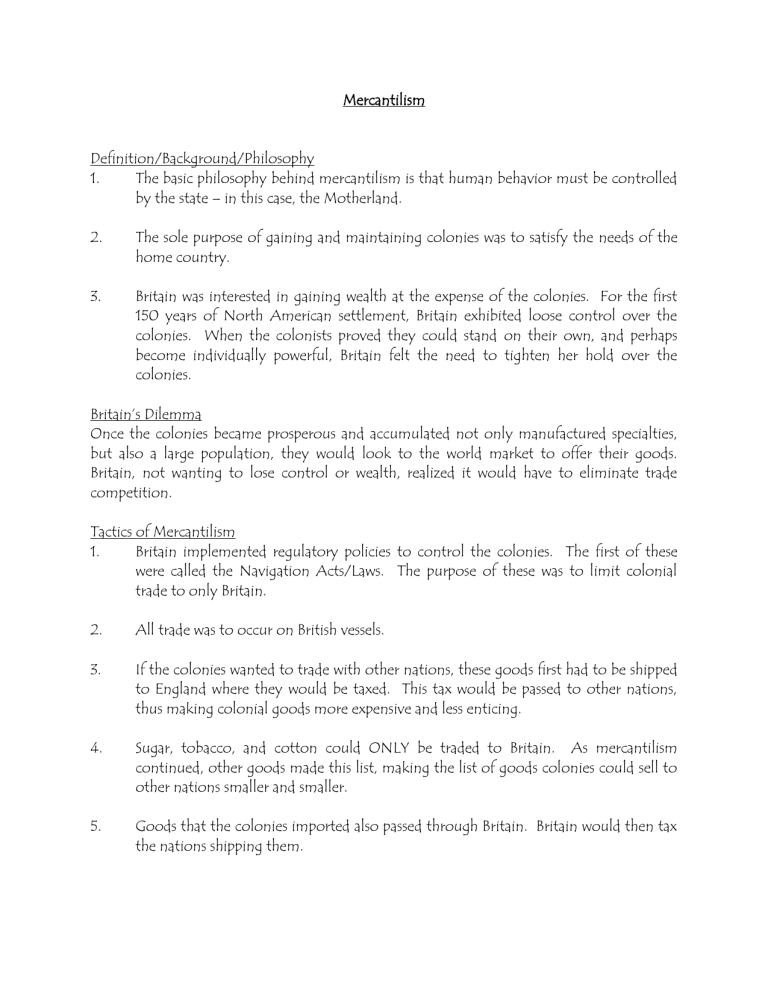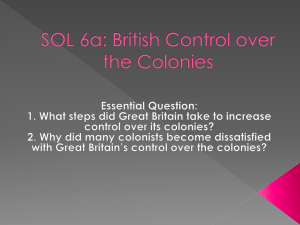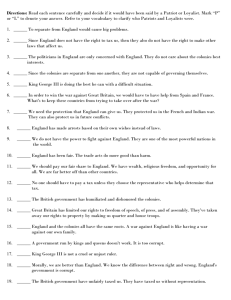
Mercantilism Definition/Background/Philosophy 1. The basic philosophy behind mercantilism is that human behavior must be controlled by the state – in this case, the Motherland. 2. The sole purpose of gaining and maintaining colonies was to satisfy the needs of the home country. 3. Britain was interested in gaining wealth at the expense of the colonies. For the first 150 years of North American settlement, Britain exhibited loose control over the colonies. When the colonists proved they could stand on their own, and perhaps become individually powerful, Britain felt the need to tighten her hold over the colonies. Britain’s Dilemma Once the colonies became prosperous and accumulated not only manufactured specialties, but also a large population, they would look to the world market to offer their goods. Britain, not wanting to lose control or wealth, realized it would have to eliminate trade competition. Tactics of Mercantilism 1. Britain implemented regulatory policies to control the colonies. The first of these were called the Navigation Acts/Laws. The purpose of these was to limit colonial trade to only Britain. 2. All trade was to occur on British vessels. 3. If the colonies wanted to trade with other nations, these goods first had to be shipped to England where they would be taxed. This tax would be passed to other nations, thus making colonial goods more expensive and less enticing. 4. Sugar, tobacco, and cotton could ONLY be traded to Britain. As mercantilism continued, other goods made this list, making the list of goods colonies could sell to other nations smaller and smaller. 5. Goods that the colonies imported also passed through Britain. Britain would then tax the nations shipping them. Advantages of Mercantilism For Britain: 1. Britain got money in the form of taxes from every direction – goods coming and goods going were taxed – all straight to Britain’s pocket. 2. Britain successfully suppressed the colonies. For the Colonies: 1. Britain did not have raw materials – the colonies did. This allowed them to specialize and was foretelling of their future ability to be self-sufficient. 2. Protection from foreign competition helped our industries grow (ex: shipbuilding). 3. Many colonial goods were not taxed by Britain if the colonies were trading directly to Britain. The result was higher profit. Foreign nations trading to Britain faced a tariff. Disadvantages of Mercantilism For Britain: 1. Nations declared war on Britain because of the Navigation Laws. Not much of a disadvantage because Britain was a world power, but the declaration of war narrowed your list of allies for future foreign policy. 2. War with France brought a whole new series of taxes to the colonists – ones that perhaps Britain would long regret – they caused a war. For the Colonies: 1. Colonies were paying much more for imports. 2. Southern planters (rice and tobacco) bore the brunt of the Navigation Laws since their goods were on the list of things that MUST be traded solely with Britain. Britain controlled the prices – there was no demand, and the price remained low. Many planters lost their farms. 3. Mercantilism bred colonial resentment and deeper hate for autocratic rule.




